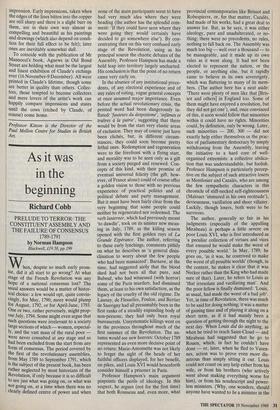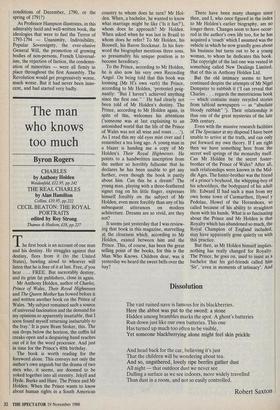As it was in the beginning
Richard Cobb
PRELUDE TO TERROR: THE CONSTITUENT ASSEMBLY AND THE FAILURE OF CONSENSUS 1789-1791 by Norman Hampson
Blackwell, f19.50, pp.199
hen, despite so much early prom- ise, did it all start to go wrong? At what stage of the French Revolution was any hope of a national consensus lost? The usual answers would be a matter of histor- ical choice: a few would opt, quite convin- cingly, for May, 1790; more would plump for August, 1792, or for April-June, 1793. One or two, rather perversely, might prop- ose July, 1794. Some might even argue that such questions were irrelevant to a society large sections of which — women, especial- ly, and the vast mass of the rural poor were never consulted at any stage and so had been excluded from the start from any form of consensus. The period covered by the first of the revolutionary assemblies, from May 1789 to September 1791, which is the subject of the present book, has been rather neglected by most historians of the Revolution, if only because it is so difficult to see just what was going on, or what was not going on, at a time when there was no clearly defined centre of power and when none of the main participants seem to have had very much idea where they were heading (the author has the splendid com- ment: 'If they could have seen where they were going they would certainly have decided to go somewhere else'). By con- centrating then on this very confused early stage of the Revolution, using as his principal source the chaotic debates of the Assembly, Professor Hampson has made a bold leap into territory largely uncharted. His conclusion is that the point of no return came very early on.
In the absence of any institutional prece- dents, of any electoral experience and of any rules of voting, vague general concepts at once assumed major importance. Even before the actual revolutionary crisis, the printed word had been dangerously in- flated: fauteurs du despotisme', infames et traftres a la patrie', suggesting that there would be from the start very elastic areas of exclusion. They may of course just have been clichés, but, in different circum- stances, they could soon become pretty lethal ones. Redemption and regeneration were to the forefront with a flying start, and morality was to be seen only as a gift from a society purged and renewed. Con- cepts of this kind, with their promise of eventual universal felicity (the gift, how- ever, of France alone) could of course offer a golden vision to those with no previous experience of practical politics and of political debate and party management. But it must have been fairly clear from the very beginning that some people could neither be regenerated nor redeemed. The verb lanterner, which had previously meant `to dawdle', took on its sinister new mean- ing in July, 1789, as the killing season opened with the first golden rays of La Grande Esperance. The author, referring to these early lynchings, comments pithily on what he describes as 'a general disin- clination to worry about the few people who had been massacred'. Barnave, at the time, had suggested airily that the blood shed had not been all that pure, and Babeuf, who had witnessed (with horror) some of the Paris murders, had dismissed them, at least to his own satisfaction, as the legacy of the cruelty of the old regime. De Launay, de Flesselles, Foulon, and Bertier de Sauvigny had all presumably been in the first ranks of a steadily expanding body of non-persons; they had only been royal bureaucrats. Unsystematic killings went on in the provinces throughout much of the first summer of the Revolution. The au- tumn would see new horrors: October 1789 represented an even more decisive point of no return: Marie-Antoinette was not likely to forget the sight of the heads of her faithful officers displayed, for her benefit, on pikes, and Louis XVI would henceforth consider himself a prisoner in Paris.
Professor Hampson's main argument pinpoints the perils of ideology. In this respect, he argues (not for the first time) that both Rousseau and, even more, what provincial contemporaries like Brissot and Robespierre, or, for that matter, Cazales, had made of his works, had a great deal to answer for. But, as he says, it was either ideology, pure and unadulterated, or no- thing; there were no precedents, no rules, nothing to fall back on. The Assembly was much too big — well over a thousand — to be manageable, and it made up its own rules as it went along. It had not been elected to represent the nation, or the people, or anything else, but it rapidly came to believe in its own sovereignty, which was flattering to many of its mem- bers. (The author here has a neat aside: `There were plenty of men like that [Bris- sot and others] in England too. Some of them might have enjoyed a revolution, but they did not get one'), and, once convinced of this, it soon would follow that minorities within it could have no rights. Minorities could, by definition, only be wrong. Later, such minorities — 200, 300 — did not exactly help either themselves or the prac- tice of parliamentary democracy by simply withdrawing from the Assembly, leaving the initiative to a hard core of well- organised extremists: a collective abdica- tion that was understandable, but foolish. Professor Hampson is particularly percep- tive on the subject of such attractive losers as Montlosier and Cazales, who are among the few sympathetic characters in this chronicle of stiff-necked self-righteousness (Malouet 'immured in his own rectitude'), deviousness, vacillation and sheer villainy. Luckily, though losers, both were to be survivors.
The author, generally so fair in his judgments (especially of the appalling Mirabeau) is perhaps a little severe on poor Louis XVI, who is first introduced as `a peculiar collection of virtues and vices that ensured he would make the worst of every possible world.' In May, 1789, he goes on, 'as it was, he contrived to make the worst of all possible worlds' (though, in the context, he makes it clear that it was Necker rather than the King who had made sure of that). Later, he refers to Louis as `that irresolute and vacillating man'. And the poor fellow is finally dismissed: 'Louis, as usual, had made the worst of a bad job'. Yet, in time of Revolution, there was much to be said for doing nothing; it was a matter of gaining time and of playing it along on a short term, as if it had mainly been a question of getting through the night to the next day. When Louis did do anything, as when he tried to reach Saint-Cloud — and Mirabeau had suggested that he go to Rouen, which, in fact he couldn't have done — or, later, when he fled to Varen- nes, action was to prove even more dis- astrous than simply sitting it out. Louis could not count on any help either from his wife, or from his brothers (who actively went about making everything worse for him), or from his nondescript and power- less ministers. (Why, one wonders, should anyone have wanted to be a minister in the conditions of December, 1790, or the spring of 1791?) As Professor Hampson illustrates, in this admirably lucid and well-written book, the ideologies that were to fuel the Terror of 1793-1794 — Unanimity, Indivisibility, Popular Sovereignty, the ever-elusive General Will, the promotion of growing bodies of non-persons, French Universal- ism, the rejection of faction, the condemn- ation of minorities — were all firmly in place throughout the first Assembly. The Revolution would get progressively worse, much worse. But it had never been inno- cent, and had started very badly.























































 Previous page
Previous page